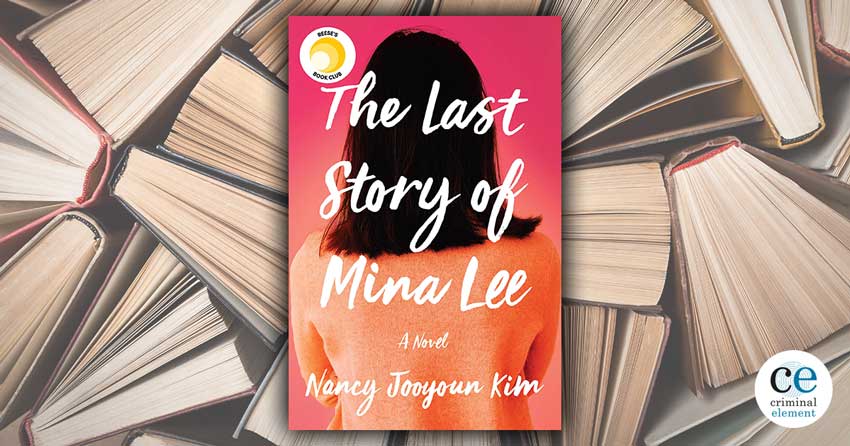Book Review: The Last Story of Mina Lee by Nancy Jooyoun Kim
By Doreen Sheridan
September 3, 2020
Told through the intimate lens of a mother and daughter who have struggled all their lives to understand each other, The Last Story of Mina Lee by Nancy Jooyoun Kim is a powerful and exquisitely woven debut novel that explores identity, family, secrets, and what it truly means to belong.
When 26-year-old Margot Lee’s best friend, Miguel, announces that he has a new job in Los Angeles—a job that will finally open a path for him to pursue the creative lifestyle frowned upon by his family—Margot is more than happy to help him move south from where they live in Seattle. Since she’s originally from L.A., she’ll be the perfect guide to help him navigate a new city. Plus, it’ll give her a chance to check in on her mother, Mina, who still lives in the Koreatown apartment where Margot grew up.
Margot and Mina have the kind of fraught relationship that is unfortunately all too common for Asian immigrant mothers and their Americanized daughters, keeping secrets and withholding affirming emotions from one another. Their connection is further complicated by a language barrier; Mina could never figure out English, and Margot gave up on trying to learn Korean in her teens, with each knowing barely enough now to communicate. Mounting frustrations do little to strengthen their bond.
How many hours had she spent, words stumbling like stones out of her mouth, trying to explain something in Korean to her mother? A utilities bill. How to work the remote control. A car insurance policy. And in those hours, Margot would always slip, somehow yelling at her mother, as her mother had often done to her as a child when she had misbehaved by oversleeping, by missing church, even by falling ill and needing to go to the hospital.
Her mother had once screamed, “How am I going to pay for this? Why don’t you take better care of yourself?” Her mother didn’t have time for empathy. She always had to keep moving. If she stopped, she might drown.
Grownup Margot is actually a little worried about Mina, who has uncharacteristically stopped returning her calls. Her worst fears are confirmed when she finds Mina dead on the floor of her apartment, seemingly the victim of a fatal slip and fall. Reeling with grief, Margot sorts through her mother’s belongings and discovers that Mina had been hiding important information about her own past, including the identity of Margot’s father. Margot is further shocked to discover that several people in her mother’s life seemed to wish Mina ill. But could any of them have hated Mina enough to want to harm her or, even worse, kill her?
I’ll be perfectly honest, as a crime-novel critic, I found the mystery parts of this novel to be fairly underwhelming. What came across very compellingly, however, was the depiction of life for American immigrants at the turn of the 21st century, particularly from Korea. Nancy Jooyoun Kim examines the history that sent numerous people across an ocean in search of a better life, then interrogates the practices of a host country that too often pays lip service in upholding the rights of the vulnerable even as it exploits their labor. One moving passage describes Mina and Margot hiding in their Koreatown apartment, watching L.A.’s Rodney King riots unfold on TV and processing what it means for them and their nation:
Her mother cried in front of the television set. Her store, too, had been destroyed. Owning a business where she didn’t have a boss yelling at her, a place where she could bring her child to work, seemed too good to be true. All of it would be shattered, too. Because their life would be part of the lie that this country repeated to live with itself—that fairness would prevail, that the laws protected everyone equally, that this land wasn’t stolen from natives, that this wealth wasn’t built by slaves but by strong industrious men, “our” founders, that hardworking immigrants proved that this was a meritocracy, that history should only be told from one point of view—that of those who won and still have power. So the city raged. Immolation was always a statement.
Told in intertwined narratives that loop back and forth in time, this is a story of regrets and lost loves as well as a powerful, often beautifully written, paean to empathy and the ongoing urgent need to uphold the rights of the downtrodden. Mina is a complex protagonist whose suffering scarred her in ways that made it difficult for her to be the mother Margot needed while she was still alive. It’s only in death that she begins to give up some of her most closely held secrets, as it becomes clear that mother and daughter both loved each other far more than they were capable of communicating. This is the kind of book that made me want to call my mom. I’m betting I won’t be the only one after readers get ahold of this sensitive exploration of familial love and the immigrant experience.
